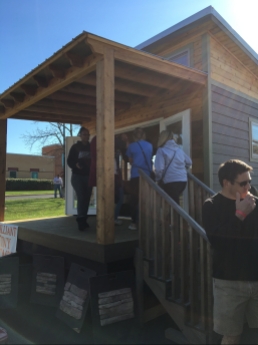 My new novella, “Big Love,” now available on Amazon from Scrivenings Press, caught me a bit by surprise. In so many ways.
My new novella, “Big Love,” now available on Amazon from Scrivenings Press, caught me a bit by surprise. In so many ways.
I wasn’t planning to write a novella. In fact, I was deep in the first draft of a full-length novel at the time.
But once the idea floated into my consciousness, a story-ette themed around the tiny house phenomenon, it seemed like fun and I had to set aside the novel and dig in.
Then came deciding what my story would be about and how to incorporate the theme of using tiny homes to combat homelessness. (Caveat: I don’t want to misinterpret my novella. It is a light-hearted, humorous, romantic romp–not, as my male character would say, “a grand statement on the human condition.”
Still, deciding the plot was not easy. I’m a Seat Of The Pants (SOTP) writer. I sit down at the computer, open a Word document, and start writing.
However, when I decided I wanted to do this novella, my wife and I had just finished touring the Tiny House Road Show (photos above) when it stopped here in Indianapolis. On a subsequent weekend trip to Cincinnati, we brainstormed a couple of ideas about how it could be approached.
What if?
What if the man in the story was a writer for an architectural journal who thought himself too sophisticated to do a story on tiny houses? What if the woman was the president of a company building tiny houses with the idea to use the proceeds to battle homelessness? Then, what if both of these people had experienced homelessness in different forms and it had drastically affected their lives, but in different, opposite ways?

Found on the Northside of Indianapolis. The spark for my main character.
But I still couldn’t seem to get the story started. One day, I’m driving around the Northside of Indianapolis and I spot a street sign for Timberly Drive and the voice of my female character just pops into my mind and starts talking.
I’m just going to put it out there. My name’s Timberly. Yeah, Timberly. Get over it. I did long ago, okay? What can a girl say? My father, the dealmaker, cut what he called a “win-win” with my mother. Trouble is, there were three people in the deal and only two of them “won-won.”
From there the story began to unfold. A theme paragraph emerged: Homelessness expanded her world and constricted his. Now she needs his help, but he only remembers the pain. Can they find big love in a tiny house?


















